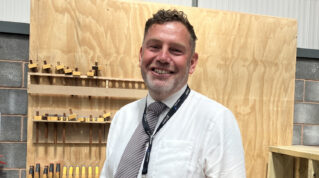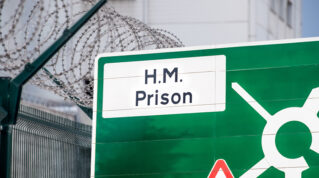The person purporting to be Adam Philip showed me “evidence” the CSCS card he was selling would evade anti-fraud smart card checker machines (designed to stop fraudsters like him), thereby getting me access to work on construction sites.
Severe skills shortages across the construction sector, arguably made worse by recent qualifications reforms, have sparked a flourishing trade in fake CSCS (Construction Skills Certification Scheme) cards. FE Week has uncovered evidence of them being sold to people without the necessary training to do building work – putting lives at risk.
We found fake CSCS cards being sold across social media networks. And in some cases, gangs have infiltrated training centres to sell cards to people who aren’t given the necessary health and safety training.
For almost 30 years CSCS cards have acted as golden tickets to work on building sites.
Getting a genuine card through official routes only costs £36. But in most cases, it requires proof that the applicant has the relevant building trade qualifications and has taken a health and safety course at a registered centre.
CSCS, the company running the scheme for the industry, explained that “this takes time and incurs costs. Fraudsters know this and tempt people to cut corners by offering a fake card”.

Soaring vacancies
The UK construction industry has faced acute skills shortages since Brexit.
The workforce had 39,000 vacancies between March and May this year, compared to 23,000 during the same period in 2016. More than 251,500 extra construction workers are needed over the next five years, says the Construction Industry Training Board (CITB), the skills body for the industry. And it said for almost a third of construction employers, finding “suitable skilled staff remains their key challenge, particularly with more older workers retiring and not being replaced”.
Philip is one of at least 10 sellers FE Week discovered flogging fake CSCS cards via the communications app Telegram.
Much of this activity is advanced fee fraud, where criminals purport to be selling CSCS cards online with “no exams needed”. In most cases, the cards never arrive in the post as promised. But some do.
Last month, GQA Qualifications Ltd posted a warning that “over the past few months we’ve had increased reports of fake CSCS cards being used on construction sites throughout the country”.
In 2023, 30 people were arrested for criminal offences related to the CITB related to the illicit facilitation, administration or undertaking of health and safety and environment (HS&E) tests – compared to just seven in 2019. Eight investigations are currently with the Crown Prosecution Service.

Training centre criminality
GQA Qualifications warned that as well as advanced fee fraud, “qualification fraud” is taking place whereby “organised criminals assist candidates to obtain a genuine qualification”, and a “centre’s integrity becomes compromised”.
In some cases of malpractice, examiners pass candidates who do not meet required standards and “deliberately falsify records to claim certificates”.
The CITB said 20 centres offering HS&E tests had been investigated for criminality since 2020, of which 12 had accreditation terminated and eight were reinstated with action plans.
In the same period, 10,000 HS&E tests were revoked. The CITB offered everyone awarded the cards the opportunity to retake the test, but take-up was low.
In 2022, Callum Ingram, 28, from Manchester, and Stephen McWhirk, 62, of Macclesfield, Cheshire, were sentenced to 28 months each for conspiring to commit fraud and fraud by false representation after falsifying CITB HS&E tests. The pair, who made £37,700 from the operation, were test centre administrators at the accredited DWM Plant Ltd in Cheshire.
Mostly foreign nationals – some of whom were found to speak no English – were assisted with their tests, with some candidates taking their tests in only four to five minutes by means of assistance via a remote mouse.

Scammers working online
FE Week has seen dozens of ads across Facebook, Instagram, TikTok and X, as well as Telegram, purporting to sell CSCS cards with “no exams” needed. CSCS itself does not operate on these social media platforms.
Some people also sell driving licences, passports and a wide range of NVQ certificates. For example, “Standard Chatered Service UK driver’s lisence [sic]”, which set up an account (@ThomasIssa999) on X in May and claims to be based in Manchester, offers “real passports” among other forms of ID, boldly stating that: “no physical participation [is] needed” to obtain them. Its Telegram account has around 500 subscribers.
In an attempt to prove he could be trusted, Philip sent me reviews from customers thanking him – which revealed he also sells diazepam. He said he would send me a level-one green labourer CSCS card and licence for £160 within four days, with a £100 deposit paid upfront and the rest paid upon delivery.

Catherine Storer, a construction training specialist at Essential Site Skills (ESS), believes there has been “an explosion in the number of fraudulent profiles across social media”.
She claimed that scammers “even provide copies of ‘example certificates’ that are evidently photoshopped with awarding body logos and providers’ logos.”
Mark Allison, an established electrician based in East Riding, was alarmed to find his image being used on online adverts for CSCS JIB gold cards, which normally require the equivalent of a level 3 NVQ in an electrotechnical field.
He describes this as “fraudulent attempts to rip vulnerable and desperate people off” and is concerned that “fake cards are commonplace” in the workplace now.
Health and safety consultant Charlene Meek said on LinkedIn that there are “far too many Facebook groups” offering CSCS cards and training certificates without practical training or exams.
“There are THOUSANDS of members on these groups, all in our industry, all asking for cards… you cannot simply take these cards at face value,” she warned. “I’ve checked many of these cards and found many are fake.”
There is also an illicit trade in CSCS cards going on offline.
A senior source from one of the largest property services contractors in the UK told FE Week that the sale of fake cards tends to be through “word of mouth” rather than online. They had persuaded a seller of such cards to stop but this person was buying them from a larger supplier who is still understood to be operating in Liverpool.
Who is applying for fakes?
Bricklayers, roofers and retrofitters are all on the government’s UK immigration salary list of jobs where migrants can be used to plug workforce shortages. But some of the foreigners working in the construction industry lack the qualifications for the job, and the English language skills needed to get them.
In the commercial heart of Birmingham, Michael and Peter from Poland are sat eating sandwiches on their lunchbreak from a job fitting windows at a building site. Although they have level-two qualifications themselves, they know other foreign construction workers who “don’t speak English, buying fake CSCS cards”, said Michael.
Peter said that “on most” construction sites now, he meets “people from Moldovia” who it is “very hard to communicate with” because of the language barrier.
Michael said the purchase of fake CSCS cards by Moldovans was “not a problem, because these guys are really good workers and are working safely – the barrier is the language.”

Challenge to stop the gangs
While some scamming operations have been shut down, it can take authorities a long time to take action.
The website of an outfit calling itself Construction Card Scheme Online UK, offering industry skills cards without tests via a WhatsApp number, was able to operate for over a year after CSCS set its lawyers on them.
CSCS’s investigations showed those responsible were taking payments but not delivering health and safety tests, training or qualifications.
FE Week also found that the posts of several apparent CSCS card fraudsters on Facebook had recently been removed.
CSCS said its fraud investigation team “constantly monitor and take action to shut such operations down”.

Chipping away at fakes
From April, CSCS replaced its card-verification platform with a new ‘Smart Check’ scheme, claiming its software would flag fake or counterfeit cards.
In the two months since, on average 2.2 million scans a month have been made under the new system, which CSCS described as “very encouraging”. But it admitted that “more work” was required to “fully integrate” the platform across the industry.
“Only with regular electronic checking of cards (using CSCS Smart Check) at site gates and collaboration between the sector and law enforcement will we be able to get ahead of the fraudsters,” it said.
Allison believes electronic card checking “does weed [the fake cards] out”. But he said the “trouble is site agents/managers don’t check often enough and take the cards at face value”.
The Smart Check system reads a CSCS card’s microchip, which stores the cardholder’s identity, qualifications and training records information.
Chartered electrical engineer Gary Alder said the microchipped cards were “the best way” of stopping fakes.
He added that clues a card is fake include a name printed in the wrong format or an expiry date “too far in the future”.

Pleas for better training
Part of the card fraud problem lies in not enough young people being trained up to join the industry.
Labour’s general election manifesto singled out the construction and social care sectors for “training plans” to reduce a “long-term reliance” on overseas workers.
“The days of a sector languishing endlessly on immigration shortage lists with no action to train up workers will come to an end,” the party claimed.
But the manifesto was silent on Labour’s approach to level 2 and 3 qualifications.
The new T Level construction courses which were launched in 2021-22 have not proven popular. In 2022-23, only 75 people started the onsite construction course, of whom 67 specialised in carpentry and joinery and only eight took bricklaying.
Another problem is that those undergoing a construction-related qualification, which requires the completion of a minimum 30-day work placement, such as T Levels, should apply for the Industry Placement CSCS card. Challenges were raised to FE Week around getting this card.
Bedford College is in its third year of offering the design, surveying and planning T Level. Its vice principal David Wilkins said only a dozen people a year had signed up for it, despite the college “really pushing” the course.

The college has had only four completions of the onsite construction and building services engineering T Level specialisms, which Wilkins said was because learners “know and we know the route to that industry is an apprenticeship. So they’re reluctant to pick up high level-three study, when if they want to be a bricklayer, they don’t need to do that level of work”.
Graham Hasting-Evans, chief executive of training provider NOCN and president of the British Association of Construction Heads, said that it was therefore “crucial” that level 2 qualifications “remain funded, or we will see even more acute pressures facing the construction industry which could lead to a further rise in people seeking to join the sector through unofficial routes, or coming in as unskilled labourers”.
Meanwhile, after trying to persuade me to send cash for a CSCS card via crypto currencies, Philip eventually assured me that the card was registered on the CSCS card checker, and sent a screenshot of a card as “proof”.
However, at the time of writing, I am still waiting for my card to arrive – and to hear from Philip again.
This story has been updated to clarify that a CSCS card for T Level industry placement students is available but that challenges were raised to FE Week around getting them.

















“In the commercial heart of Birmingham, Michael and Peter from Poland are sat eating sandwiches on their lunchbreak from a job fitting windows at a building site.”
Focus in on drinks cans they are having for lunch and you’ll get a glimpse of another problem rife within the industry.